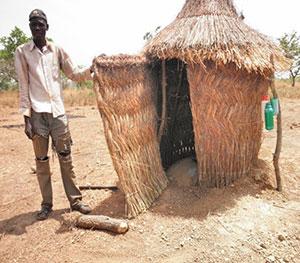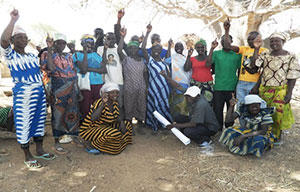Villagers in Ghana Embrace Better Sanitation for Health

Gratitude and excitement are evident in Gmangun Charles’ voice as he describes his family’s new latrine. “I am happy that I and my family do not defecate in the open again. I have restored my lost dignity.” Until recently, no one in the town of Kubone had access to a household latrine, and all families, including Charles’, relieved themselves in the open.
Kubone is a village in the Mion District of Ghana’s northern region where, for generations, open defecation was the norm. This practice contributed to health problems in the community, particularly for children. Diarrhea in children under two years of age was common and increased family spending on healthcare.
Since SPRING/Ghana “triggered” Kubone in February 2015, 47 household latrines have been established. Open defecation in the community is now frowned upon.
In February 2015, in response to these challenges, SPRING began working with the citizens of Kubone to establish community-led total sanitation (CLTS), an approach that helps rural communities understand the dangers of poor sanitation and adopt solutions. Since that time, according to Water, Sanitation, and Hygiene (WASH) Committee Chairman Simon Kidinyun, Kubone has made significant progress toward improving the hygiene and health status of its children. “Just with five Ghana cedis (US$ 1.50), I have restored my dignity by constructing a household latrine,” Kidinyun said.

SPRING/Ghana is supporting CLTS in Mion district by collaborating with the Ghana’s Environmental Health and Sanitation Department. Since the project “triggered” Kubone in February by educating people about the health risks of open defecation, 47 household latrines have been established. Open defecation is now frowned upon, encouraging mothers and other caregivers to develop better hygiene habits.
The people of Kubone cannot hide the pride they feel for their new facilities. Residents have taken it upon themselves to encourage their neighbors to improve their own hygiene and sanitation situation. A community representative stated that the community is “thankful to SPRING/Ghana and all her collaborators for bringing attention to the issue and offering solutions.”
SPRING/Ghana is now working to achieve and sustain similar results in each of the 15 districts in Northern Ghana where it is active.